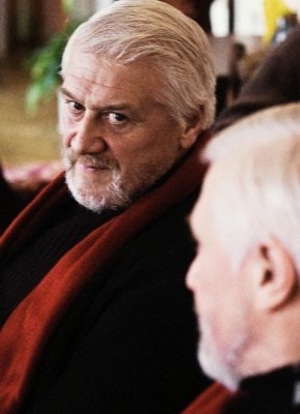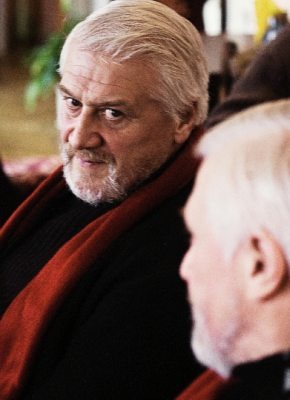J.VAITKUS: “THE TASK OF THE THEATRE IS NOT TO SATISFY SENSES OF INDIVIDUALS BUT TO ENCOURAGE THEM TO THINK” 0
(90 years to Kaunas State Drama Theatre)*Vidmantas Kiaušas
www.kamane.lt , 2010 11 02
J. Vaitkus. Photos by M.Kiaušaitė
In brief: Kaunas State Drama Theatre is creating its repertoire of the 90th season along with former most famous directors of this theatre. These are Jonas Jurašas, Jonas Vaitkus, Gytis Padegimas, Gintaras Varnas.
J.Vaitkus worked as a director at Kaunas Drama Theatre in 1975-1978, as the principal director in 1980-1988. During the 13 years of his work (he also worked at the theatre in 1978-1980 when he studied directing in Moscow), J.Vaitkus directed 25 performances at Kaunas Drama Theatre. At the moment he is the head of the Lithuanian Russian Drama Theatre. Extracts from the interview with the director are presented.
When did you understand that the language of theatre was your natural language?
My first meeting with theatre was via music and after-school classes at school. I studied at the Technical School of Culture and Education for one year, where I had good teachers: Aldona Grivickienė and actor of the Academic Drama Theatre Antanas Semaška. These people encouraged me and revealed that work at theatre was complicated, serious and responsible.
During the studies at Leningrad State Institute of Theatre, Music and Cinematography, I was taught by Zinovij Korogodsky. During the first trip to London, the vision of my theatre formed. At that time I staged the tragicomedy “Love, Devil and Jazz” of Juozas Grušas. The performance was prohibited after the first show, and it was then that I understood that theatre could not remain at the roadside of real events, that it was concerned with social problems and that it was an active institution in life. I understood the meaning of work in theatre: the task of the theatre is not to satisfy senses of individuals but to encourage them to think. Theatre serves as a vaccine: after seeing a real, live performance a person comes through a short illness, he/she pictures himself/herself in the place of the hero, thinks what he/she would do, whether he/she would have courage to behave in one or another way.
You are speaking about the power of theatre. What would you say about the weak sides of it?
At the moment the weakness of theatre is its distancing from reality, pains and problems. Theatre bends to the side of a hybrid of circus, pop-concert, installations, dirty ribalds, which pleases the senses of a spectator.
How does theatre creating professional works feel at the moment?
Visualisation is a very popular but very superficial and cheapest phenomenon of these days killing imagination. I look around and I do not understand why such contradictory feelings appear. Theatre seems to have lost its place, it looks confused and not knowing how to get to the organism of the state. Theatre is always the opposition to any authorities. Authorities do everything for the theatre to be toothless, unproblematic, they try to make it entertaining rather than speaking to a man.
It seems that it was not easy for you to work at Kaunas Drama Theatre. Why did you leave the theatre for the first time?
I was cast out of Šiauliai Theatre with the title of a “gangster-director”. I had no work for some time. Later I received an offer to stage “Wooden Doves” of Kazys Saja at Kaunas Drama Theatre. Some people tried to create a conflict between me and the principal director of the theatre at that time, late Vytautas Čibiras. I left for cinema courses in Moscow and directed performances in Kaunas at the same time.
You became the principal director of Kaunas Drama Theatre after the courses and created many artistically persuasive and harsh performances; you tried to reorganise the theatre and left it again. Why?
I left the theatre after thirteen years. It was due to actors who felt that they were popular and did not need a director any longer. Once I brought the new course, Ingeborga Dapkūnaitė, Virginija Kelmelytė, Povilas Budrys with new performances to the theatre, I invited Algimantas Masiulis, Juozas Budraitis, Regimantas Adomaitis from other theatres. The old actors did not like it, they started revolting. I decided not to fight. I staged “Golgotha” according to the novel of Chingiz Aitmatov “Scaffold” and left the theatre.
I went to Vilnius. I started working at the Lithuanian State Academic Drama Theatre as a regular director, staged a number of performances. After I started heading this theatre, I invited former students from Kaunas, sheltered a number of young actors with the director Oskaras Koršunovas and his works. The Academic Drama Theatre became the youngest theatre in Lithuania. Do you know how I was kicked off from it? This theatre was the theatre of ladies, prima donnas and misters from the Central Committee and the Government then, and when the re-baptised communists returned to the government, the interests of these ladies and misters came to light again.
It is strange that some theatres are headed by actors or managers rather than professional directors. Why does it happen?
The aim is to make theatre non-dangerous. It is easier in this way. What actors may say to each other? They are very handy to the Ministry of Culture. It gives the money and lets them stage vaudevilles with a condition that the ministry would not be disturbed. Earlier the directors Povilas Gaidys, Aurelija Ragauskaitė, Juozas Miltinis, Henrikas Vancevičius, Jonas Jurašas, Gytis Padegimas, I myself in a way, collectives of theatres were hot spots in the towns where we worked. You know what happened later, who headed the Ministry of Culture and theatres.
National theatre and national dramaturgy. How do you succeed to cooperate with writers?
There are enough of talented men of letters. We should keep the balance between the national and world classics, and directors should cooperate with playwrights.
What do you demand from future actors and directors while lecturing at the Academy of Music and theatre?
The most important is that a student would be honest, would like to work, would have ideas and strive to implement them. I try to see as many performances as I can and say my notes when there are people willing to hear them.
You plan to invite Kaunas inhabitants to a premiere in spring.
I am thinking about a performance according to the novel of Fyodor Dostoyevsky “The Brothers Karamazov”. Still, it will not be staged for the 90th anniversary of the theatre necessarily. Dates are not important to me. I will do the work when I can. I have other ideas too. I have not lost hope to stage the musical of Laimis Vilkončius “Eglė, Queen of Grass-snakes”; theatregoers will also see the play of Leonid Andrejev “The One who is Slapped” and “Christmas Tree at Ivanovy’s” of Aleksandr Vvedensky at the Russian Drama Theatre. Herkus Kunčius has written a play “Clan”, Arvydas Juozaitis – “Heart in Vilnius”.
What is the theatregoer of today like?
Theatregoers have changed a lot, they are influenced by TV series, pop culture, various shows. Many real theatre-goers have left halls of theatres. It is enough for the theatre to lose its vitality for a moment, and people turn backs to it. It is very hard to bring people back.
What would you say about actors? Is it easy to find them for planned performances?
It is a very hard work. Fingers of hands would be enough to calculate the ones who do not work in television, are not announcers of entertaining events, do not try to earn money in various ways. When the actor’s voice becomes a worn-out cloth, one cannot speak about persuasion or responsibility, Still, we should speak about the absence of theatre policy here again. When creation becomes the priority of theatre rather than financial indexes, we will not be forced to speak about the falling artistic and professional level of all theatres.
-----------------------
*) The actors of the Drama Circle performed “Feast of St. John” of Hermann Sudermann directed by Jonas Vaičkus for the first time at Kaunas City Theatre (present Kaunas State Musical Theatre) on the 19th of December of 1920. The history of professional Lithuanian theatre and Kaunas State Drama Theatre started with this premiere.


